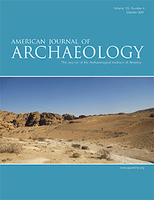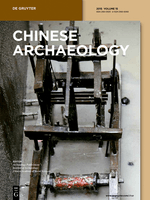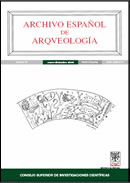
JOURNAL OF EGYPTIAN ARCHAEOLOGY
Scope & Guideline
Illuminating the Secrets of Egypt's Past
Introduction
Aims and Scopes
- Interdisciplinary Research:
The journal emphasizes a multidisciplinary approach to Egyptology, integrating archaeology, history, art history, anthropology, and philology to provide comprehensive insights into ancient Egyptian culture. - Fieldwork and Excavation Reports:
A significant portion of the journal's publications is dedicated to reporting on recent archaeological excavations and fieldwork, highlighting new discoveries and their implications for understanding ancient Egyptian society. - Cultural and Historical Analysis:
The journal aims to analyze the cultural, social, and political aspects of ancient Egypt, often exploring themes such as power dynamics, religious practices, and the role of material culture in society. - Textual Studies and Linguistics:
There is a consistent focus on the study of ancient Egyptian texts, including hieroglyphs and papyri, contributing to the understanding of language, literature, and administrative practices in ancient Egypt. - Heritage and Preservation:
The journal also addresses contemporary issues related to the preservation of Egyptian cultural heritage, discussing the impact of modernity on archaeological sites and the importance of conservation efforts.
Trending and Emerging
- Social Archaeology and Identity:
There is a growing trend toward exploring social identities and community dynamics within ancient Egyptian society, moving beyond traditional elite-focused narratives. - Environmental Archaeology:
Research exploring the relationship between ancient Egyptians and their environment, including studies on land use, climate impact, and resource management, is becoming increasingly prominent. - Digital Humanities and Technology in Archaeology:
The application of digital tools for archaeological research, including GIS and remote sensing, is emerging as a significant area of study, facilitating new insights into ancient landscapes. - Contemporary Relevance of Ancient Practices:
Scholarly work examining the relevance of ancient Egyptian practices in contemporary society, such as heritage management and the impact of tourism, is gaining attention. - Cultural Interactions and Exchange:
A focus on cross-cultural interactions, including the influence of neighboring cultures on ancient Egypt and vice versa, is becoming more prevalent, reflecting a broader interest in cultural dynamics.
Declining or Waning
- Traditional Art Historical Studies:
There seems to be a waning focus on strictly traditional art historical analyses, as more interdisciplinary approaches incorporating social and cultural perspectives gain traction. - Classic Egyptological Narratives:
Research that relies heavily on established narratives of ancient Egyptian history without integrating new archaeological findings or theoretical frameworks appears less frequent. - Monumental Architecture Studies:
While still relevant, the emphasis on monumental architecture without contextual social analysis is less prevalent, as scholars increasingly seek to understand the broader implications of architectural practices. - Isolated Artifact Studies:
The focus on singular artifacts in isolation from their broader cultural context is declining, with a shift towards understanding objects within their social and ritual practices.
Similar Journals

ARCHAEOLOGY
A Scholarly Journey Through Time and CultureARCHAEOLOGY is a distinguished peer-reviewed journal published by the Archaeological Institute of America, focusing on the multifaceted aspects of archaeological research and its relevance to contemporary society. Established in 1966, this journal serves as a critical platform for scholarly discourse in the field, showcasing innovative findings, theoretical advancements, and methodological discussions related to archaeology. While it maintains a Q4 ranking within the disciplines of archaeology and arts and humanities, its contributions remain valuable for those engaging in archaeological studies or seeking to understand historical and cultural narratives. The journal is accessible in print, with an ISSN of 0003-8113 and an E-ISSN of 1943-5746, ensuring that a wide audience can benefit from its insights. Although currently not classified as Open Access, the meticulous peer-review process ensures a high standard of academic rigor, making it an essential source for researchers, professionals, and students alike who are dedicated to exploring the past through archaeological lenses.

Journal of Egyptian History
Advancing Scholarship in Egyptian Historical Studies.The Journal of Egyptian History, published by BRILL, stands at the forefront of scholarly exploration in the vibrant field of Egyptian historical studies. Established to enhance our understanding of Egypt's rich historical landscape, this journal is recognized for its substantial contribution to the historiography of ancient and modern Egypt, evidenced by its impressive Q2 ranking in the history category, as well as a significant Scopus rank of 379 out of 1760, placing it in the 78th percentile. With an ISSN of 1874-1657 and an E-ISSN of 1874-1665, this journal publishes peer-reviewed articles that encompass archaeological findings, cultural analyses, and interdisciplinary approaches that are essential for scholars, professionals, and students alike. Although it operates under a subscription model, researchers can access a wealth of knowledge through its dynamic publications that span various periods, particularly focusing on converged years from 2008, 2010 to 2019, and 2021 to 2024. Located in Leiden, Netherlands, the Journal of Egyptian History is a pivotal resource for those dedicated to advancing the study of Egypt's past within the broader context of global history.

Egyptian Journal of Archaeological and Restoration Studies
Advancing Knowledge in Cultural Heritage Preservation.Welcome to the Egyptian Journal of Archaeological and Restoration Studies, a vital resource for scholars and practitioners in the field of archaeology and restoration. Published by the renowned SOHAG UNIV PUBLICATION CENTER-SUPC, this journal aims to disseminate cutting-edge research that illuminates the rich archaeological heritage of Egypt and beyond. With ISSN 2090-4932 and E-ISSN 2090-4940, this journal showcases innovative methodologies and interdisciplinary approaches, significantly contributing to our understanding of cultural heritage preservation. The journal's growing influence is reflected in its Q3 ranking in multiple categories, including Archaeology, Conservation, and Cultural Studies as of 2023, alongside its noteworthy placement within the Social Sciences. Open access options provide wider accessibility to essential studies, making it an indispensable tool for researchers, professionals, and students alike. Join us in exploring the past and shaping the future of archaeological scholarship.

AMERICAN JOURNAL OF ARCHAEOLOGY
Transforming Excavations into Global KnowledgeThe American Journal of Archaeology (ISSN: 0002-9114, E-ISSN: 1939-828X), published by the esteemed University of Chicago Press, stands as a leading scholarly journal in the field of archaeology, celebrated for its rigorous peer-reviewed research. With an impressive impact factor that places it in the Q1 quartile for both archaeology and archaeology within the arts and humanities, this journal ranks among the top 15% in its field, according to Scopus metrics. It serves a global audience of researchers, professionals, and students, facilitating the dissemination of innovative findings from excavations, historical analyses, and methodological advancements. While primarily available through subscription, the journal's archives and features provide invaluable resources for deepening one's understanding of the past and engaging with current archaeological discourse. Operating from its home in Chicago, USA, the American Journal of Archaeology actively contributes to the advancement of knowledge and scholarship in archaeology, making it an essential platform for those invested in the exploration of ancient civilizations and cultural heritage.

Cuadernos de Prehistoria y Arqueologia-Universidad Autonoma de Madrid
Charting New Territories in Archaeological ResearchCuadernos de Prehistoria y Arqueologia-Universidad Autonoma de Madrid is a distinguished academic journal dedicated to the fields of archaeology and prehistory, published by the Universidad Autonoma de Madrid, Departamento de Prehistoria y Arqueología. With an ISSN of 0211-1608, this journal plays a crucial role in disseminating significant research findings and theoretical advancements within these domains. Recognized for its scholarly excellence, it holds impressive quartile rankings in 2023, including Q2 in Archaeology and Q1 in History, reflecting its high impact within the academic community. While currently not an open-access publication, Cuadernos de Prehistoria y Arqueologia provides valuable insights to researchers, professionals, and students engaged in the exploration of human history and cultural heritage from 2018 to 2024 and beyond. With a commitment to fostering interdisciplinary dialogue, this journal serves as an essential platform for innovative studies and comprehensive reviews, contributing to the advancement of knowledge in archaeology and prehistory.

Yorkshire Archaeological Journal
Illuminating Archaeological Narratives of YorkshireYorkshire Archaeological Journal, published by Routledge Journals, Taylor & Francis Ltd, stands as a pivotal resource in the field of archaeology, particularly focused on the rich heritage and archaeological research within the Yorkshire region of the United Kingdom. With a dedicated ISSN of 0084-4276 and an E-ISSN of 2045-0664, this journal provides both researchers and practitioners valuable insights into archaeological discoveries, methodologies, and theoretical frameworks. While it holds a Q3 ranking in both Archaeology (Arts and Humanities) and Archaeology (Social Sciences), its contributions remain significant for advancing discussions and knowledge within the discipline. The journal's archival depth, converging from as early as 1980 and continuing robustly into 2024, showcases a commitment to fostering academic discourse and exploration of archaeological heritage. Although it does not currently offer open access, its rigorous peer-reviewed articles make it an essential reference for academics, professionals, and students alike who are eager to deepen their understanding of archaeology and its applications.

Chinese Archaeology
Exploring the Rich Tapestry of Chinese HeritageChinese Archaeology, published by WALTER DE GRUYTER GMBH, is a leading journal dedicated to the exploration and study of China's rich archaeological heritage. With an ISSN of 2160-5025 and an E-ISSN of 2160-5068, this journal serves as an essential platform for scholars, researchers, and enthusiasts in the field of archaeology, offering a blend of original research articles, reviews, and critical essays that address both contemporary issues and historical narratives. While it currently operates under a conventional access model, making cutting-edge research available to a select audience, it plays a crucial role in advancing knowledge about China's archaeological sites, artifacts, and past civilizations. Given the increasing interest in Eastern archaeology and its significance in a global context, Chinese Archaeology is positioned as a pivotal resource for understanding and interpreting the complexities of China’s historical evolution. Researchers and academics are encouraged to contribute and engage with this vital field of study to foster greater insights and innovations.

ZEITSCHRIFT FUR AGYPTISCHE SPRACHE UND ALTERTUMSKUNDE
Unveiling the Mysteries of Language and CultureZEITSCHRIFT FUR AGYPTISCHE SPRACHE UND ALTERTUMSKUNDE, published by Walter de Gruyter GmbH, is a preeminent journal in the field of Egyptology, archaeology, and history. With roots tracing back to 1863, the journal has made significant contributions to the understanding of ancient Egyptian language and culture through rigorous scholarship and a commitment to academic excellence. The journal is subscribed to both print and digital formats, offering comprehensive access to a diverse range of critical research articles and reviews that appeal to researchers, students, and professionals alike. Presenting a unique blend of linguistic, historical, and archaeological perspectives, the journal has maintained a steady presence in academia despite fluctuating publication periods. In 2023, it ranks in the Q3 and Q4 quartiles across multiple categories, emphasizing its relevance and ongoing contributions to the understanding of ancient civilizations. Researchers looking to dive deep into the intricacies of Egypt's linguistic heritage and cultural contexts will find this journal an invaluable resource.

Prilozi Instituta za Arheologiju u Zagrebu
Advancing archaeological discourse and heritage exploration.Prilozi Instituta za Arheologiju u Zagrebu is a prominent academic journal published by INST ARHEOLOGIJU, dedicated to advancing the field of archaeology and related historical studies. Operating in Croatia, this journal serves as a vital platform for scholars, researchers, and students to disseminate innovative research and insights within the realm of archaeology, with a focus on the rich cultural heritage of the region. The journal spans contributions from 2002 to 2011 and has ongoing publication since 2013, reflecting its commitment to contemporary archaeological discourse. With a growing reputation, it has achieved a Q3 ranking in the fields of Archaeology and Arts and Humanities, and a Q2 ranking in History, signifying its impact and relevance in the academic community. Although Open Access options are not available, the journal remains an essential resource for those pursuing in-depth knowledge and research in archaeology. Researchers can harness the journal's extensive scope to explore critical historical narratives and archaeological findings, solidifying its importance in both local and global contexts.

Archivo Espanol de Arqueologia
Pioneering archaeological scholarship for a global audience.Archivo Español de Arqueología is a prestigious journal published by the Consejo Superior de Investigaciones Científicas (CSIC), dedicated to the field of archaeology and the historical sciences. Since its transition to Open Access in 1991, this journal has been a significant resource for scholars and practitioners in Spain and beyond, ensuring the dissemination of high-quality research to a broad audience. With an impressive Scopus ranking that places it within the top 20% of journals in the disciplines of History and Archaeology, Archivo Español de Arqueología plays a crucial role in advancing academic discourse and promoting innovative archaeological methodologies. The journal has maintained rigorous standards, reflected in its placement within the Q2 and Q3 quartiles, enabling it to establish a reputation for excellence and reliability in archaeological scholarship. Researchers, professionals, and students are encouraged to explore the journal's diverse array of articles from its foundation year of 2009 to the present, enriching their understanding of the past through the latest findings and theoretical advancements in archaeology.